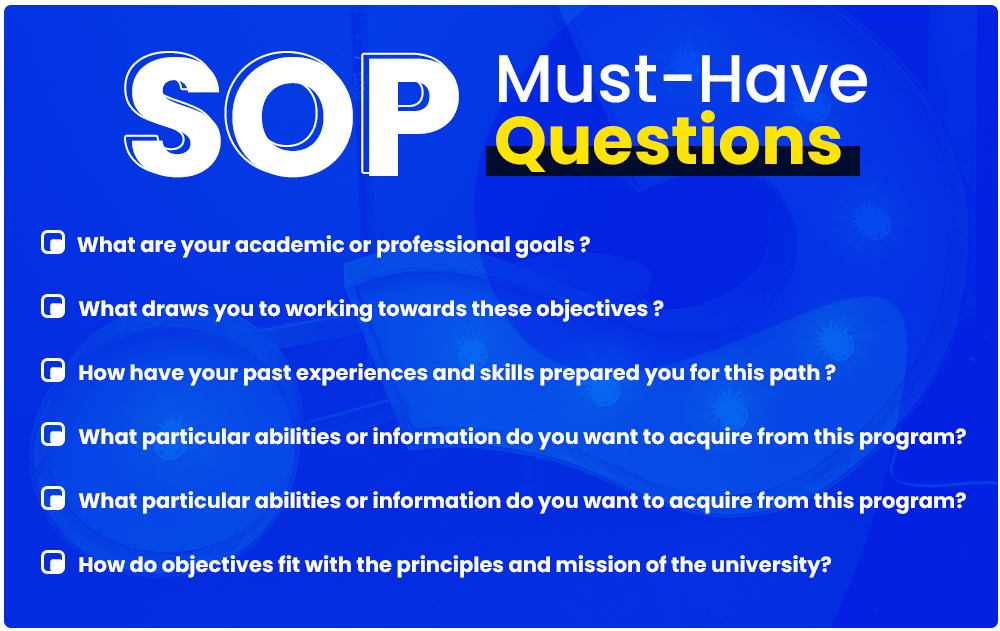Statement of Purpose (SOP) is an essay-like admission requirement for universities. Here you have to write about your career aspirations, interests, goals, the choice of field, and all about it. It is also known as a letter of intent or research statement. It is your chance to impress the admission committee and creatively show how you are a good fit for the program and university.
You can get the chance to demonstrate your drive, objectives, and program eligibility in the SOP. It is your time to discuss your motivation for applying to the program according to your background and prior experiences fit with its objectives and expectations.
SOP should be interesting and clear and place a lot of focus on your academic accomplishments and objectives. In addition, you should list any significant volunteer work you have done, extracurricular events you have participated in, and any studies or initiatives you have undertaken that highlight your expertise in the area.

Here is all you need to do to write an interesting SOP for university admission:
1. Learn and Understand the Purpose of SOP
The Statement of Purpose (SOP) explains the person you are, your educational and career history, your ambitions, and your motivations for applying to their program to the admissions committee. The SOP is your chance to demonstrate your dedication to the subject, related experiences and talents, and the likelihood of succeeding in the program.
The admissions committee uses the SOP to determine whether you are a good fit for the program and to make admissions choices. They seek proof that you are dedicated to completing the program, have the abilities and information required to succeed, and clearly understand your goals.
2. Look into the University and Program
Before you start writing, do research on the university and program to which you're applying. Explore their objective, principles, and coursework, and consider how your preferences and ambitions align with theirs. It would help you curate a well-researched SOP for university admission.
You can start by exploring the website, carefully reading the course descriptions and requirements, and researching the faculty members for their education history and accomplishments. Additionally, you can connect with current students of the university and alum. This research will assist you in tailoring your SOP to the particular program while demonstrating your expertise and zeal for the field.
3. Begin with a Captivating and Powerful Opening
The opening of your SOP should pique the reader's interest and entice them to continue reading. Consider beginning with a personal anecdote, an unexpected fact, or a provocative question that tries to set the tone for the remaining portion of your essay. Your Statement of Purpose (SOP) must have a compelling introduction to grab the reader's attention and leave a positive first impression.
As the admissions committee examines hundreds of SOPs, capturing their interest right away is critical; the compelling introduction can encourage people to continue reading. A strong start can show your enthusiasm for the topic and your will to succeed in the program. It might demonstrate your dedication and commitment to the subject. A powerful opener can allow you to make an excellent first impression, show enthusiasm for the topic, and draw the reader in immediately.
4. Share your Unique Story
Giving context and depth to your application can be achieved by telling your story in your Statement of Purpose (SOP) for university admission. Your SOP should demonstrate your distinctive perspective and background. Be careful not to sound cliched or like someone you're not. Instead, be open and sincere when describing your background and the circumstances that led you to apply for the program.
Include specific accomplishments and experiences in your story that show off your abilities, knowledge, and potential. Keep your tale relevant to the program you are applying for. Overall, relating your experience to the admissions committee through your SOP can help you establish a personal connection, highlight your distinctive viewpoint and experiences, and highlight why you are a strong candidate for the program.
5. End with a Fierce Speech
Your conclusion should restate your main ideas and leave the reader with a positive impression. Consider concluding with a statement of purpose reiterating your dedication to the topic and enthusiasm for the program or a concluding anecdote connecting the essay's themes. Summarize the primary ideas you briefly covered in the SOP, emphasizing your most significant successes, learnings, and objectives. It emphasizes the point you are trying to make and highlights your advantages to the reader.
Your SOP should be concluded with a powerful, memorable phrase that will stay in the reader's mind. It can be a personal reflection, a call to action, or a quote that connects your background with why you want to enroll in the program. A solid conclusion can help leave the reader with a favorable impression, summarise your mainstream arguments, and show enthusiasm and gratitude for applying.
A statement of purpose should be clear, concise, and compelling, and it should convince the reader that you are a strong candidate committed to your chosen path. Remember that the SOP is your opportunity to present your persona, experiences, and objectives to the admissions board. Don't hesitate to show your passion for the field and use this chance to highlight your abilities and discuss why you're an excellent fit for the program.
